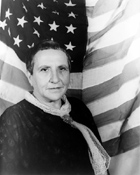Gertrude Stein
(1874-1946)

Gertrude Stein was born on February 3, 1874, in Allegheny, Pennsylvania. At the age of three, her family moved first to Vienna and then to Paris. Although Stein’s parents belonged to a synagogue, they did not raise their children to be practicing Jews. She returned to America with her family in 1878, settling in Oakland, California. Stein attended Radcliffe College and studied under the psychologist William James, graduating in 1897.
In 1902, Stein moved to France during the height of artistic creativity gathering in Montparnasse. From 1903 to 1912 she lived in Paris with her brother Leo and lover Alice B. Toklas. She and her brother compiled one of the first collections of Cubist and modern art.
Stein began to write in earnest: novels, plays, stories, and poems. Some of her early works include Things as They Are (completed in 1903, but not published until after her death), Three Lives (1909), and The Making of Americans (completed in 1911, but not published until 1966). Her work was rarely published, however. Many of her experiment works such as Tender Buttons (1914) have since been interpreted by critics as a feminist reworking of patriarchal language. The biggest visual or painterly influence on Stein’s work is that of Cezann, specifically in her idea of equality. In addition Stein’s work is funny and multilayered, allowing a variety of interpretations and engagements.
Stein wrote in long hand, typically about half an hour per day. Toklas would collect the pages, type them up and deal with the publishing and was generally supportive. Toklas even founded the publisher “Plain Editions” to distribute Stein’s work. In 1932, she wrote The Autobiography of Alice B. Toklas; the book would become her first best-seller. Despite the title, it was really her own autobiography. Her other popular works include Four Saints in Three Acts (1934), an opera with music by Virgil Thomson, Everybody’s Autobiography (1937), Paris, France (1940), and Brewise and Willie (1945).
By the 1920s her salon in France, attracted many of the great artists and writers including Ernest Hemingway, Henri Matisse, and Thornton Wilder. She coined the term “Lost Generation” for some of these expatriate American writers. Her judgements in literature and art were highly influential.
With the outbreak of World War II, Stein and Toklas moved to a country home in Bilignin, Ain, in the Rhone-Alpes region. Stein died on July 27, 1946, at the age of 72, from stomach cancer.
Sources: "Gertrude Stein (1874 - 1946)." American Jewish Historical Society, American Jewish Desk Reference, (NY: Random House, 1999). pg. 561-2, Wikipedia


